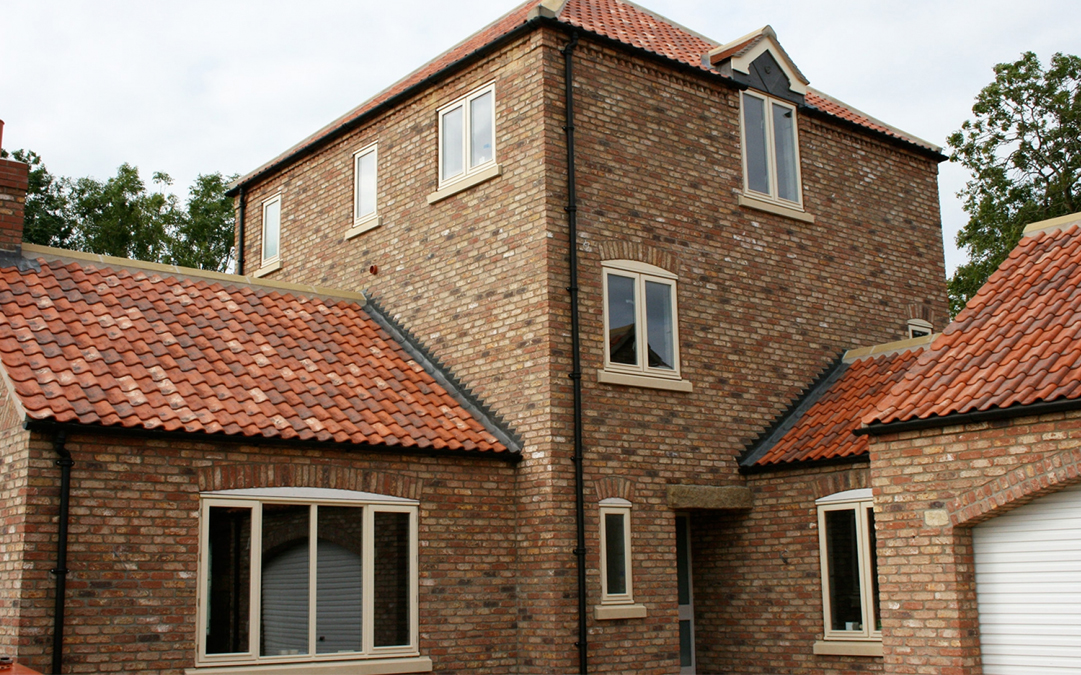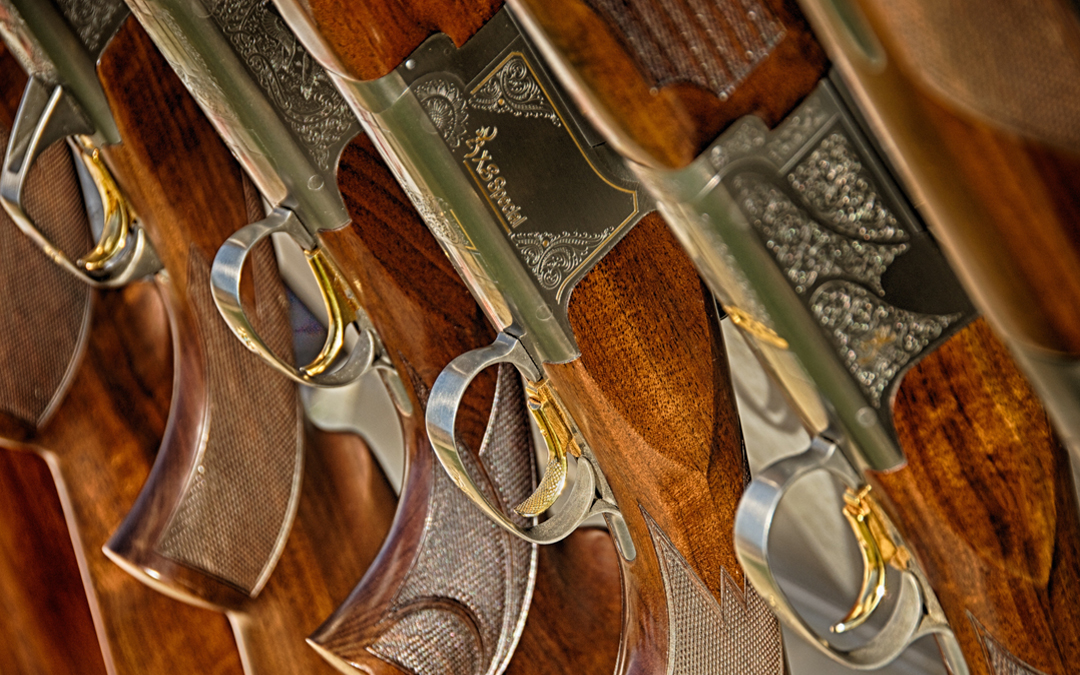This guide is a comprehensive guide to apartment and flat security, with tips and advice from the security experts at Latham’s.
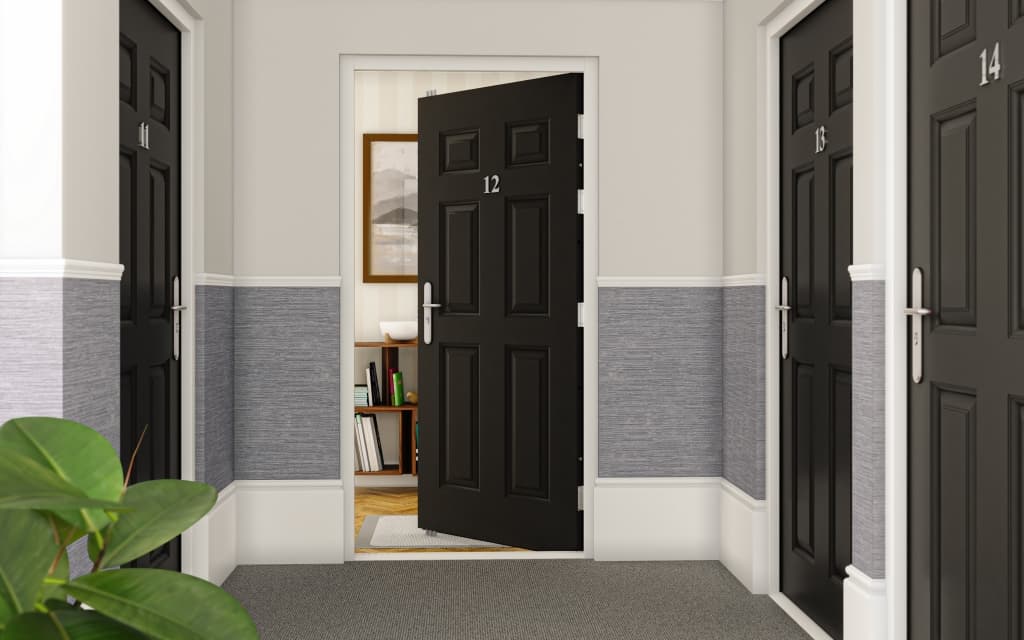
Flat security refers to the measures taken to ensure the safety and protection of residents and their possessions in a flat. Security measures include installing locks, window and door security, lighting, and surveillance. These measures will help protect personal belongings and valuables, reduce crime risk, and provide peace of mind. Flats in multi-unit residential buildings are at a higher risk of security threats due to multiple entry points and shared spaces. Ground-floor and basement flats are at higher risk of burglary when compared to higher-level flats, and are 48% more likely to suffer a burglary. Take a look at our 14 tips to secure your apartment to ensure you are doing everything possible to keep your home secure.
Securing the external perimeter of your flat
The protection of your flat begins from the outside. Thanks to the innovation of security technology, many avenues of defence are available to secure the external perimeter of your flat. It can feel overwhelming when deciding on the best security measures that maximise perimeter security. It’s important to be aware of all the different parts of the building and identify all of the high-risk areas. This will help you to select the most appropriate and effective perimeter security technology. We will now look at some of the most effective ways to secure the external perimeter of your flat.
1. Install CCTV
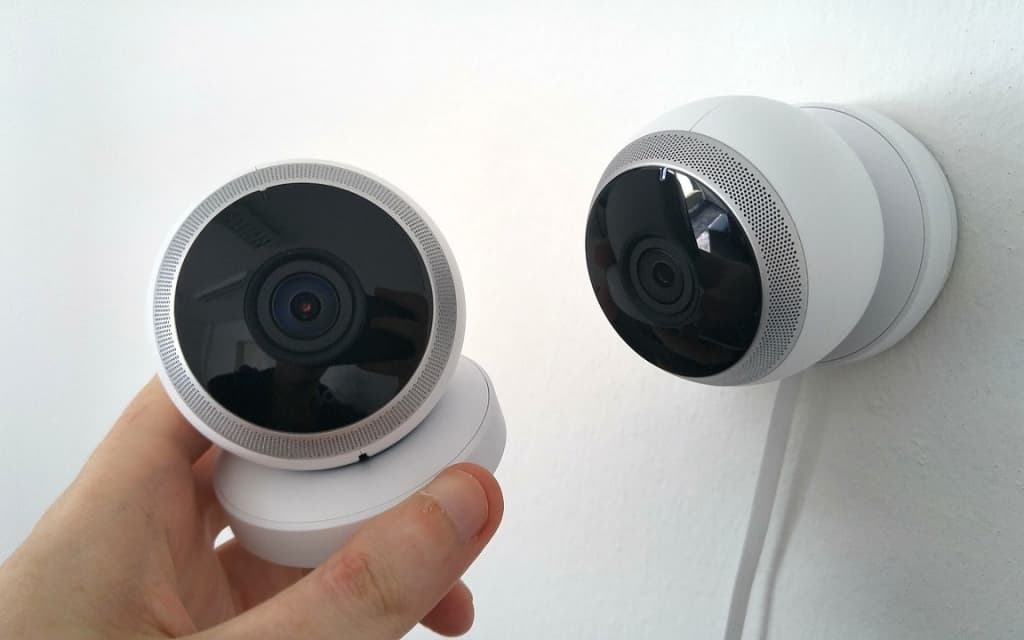
Due to easy installation and prices that suit various budgets, CCTV has become an affordable and easy way to protect your flat’s external perimeter. It’s important to note that a domestic CCTV system needs to operate in a responsible way that respects the privacy of others. These are just some of the reasons installing CCTV will improve flat security:
Crime Investigation
- Identification of suspects: CCTV footage can be used to identify suspects in a criminal case. Once a suspect is identified, law enforcement can use this information to make an arrest and prosecute the offender. By removing the offender from the community, future criminal activity is prevented.
- Community awareness: Providing CCTV footage as evidence can increase community awareness of criminal activity and encourage citizens to report suspicious behaviour. The more aware people are of the potential criminal activity in their community, the more likely they are to report it, which can lead to more arrests and a reduction in future criminal activity.
- Improved investigations: CCTV footage can provide valuable evidence to law enforcement, leading to more successful investigations and prosecutions. By showing that criminals will be caught and held accountable for their actions, the justice system can defer future criminal activity.
Remote Monitoring
- Immediate response: When you can access CCTV from your smartphone, you can immediately respond to any security breaches or potential threats. This quick response can help prevent or minimise damages.
- Increased surveillance: Remote access to CCTV can increase the coverage of surveillance by allowing you to monitor your property from anywhere. You can check in on your home or business even when you’re away, giving you added protection and security.
- Real-time monitoring: By accessing CCTV remotely, you can monitor events in real time, which can provide valuable information on suspicious activity or potential threats.
- Evidence gathering: Remote access to CCTV can help gather evidence in case of a security breach. You can capture footage of suspicious activity, which can be used by law enforcement to identify suspects and make arrests.
- Quick response to emergencies: Remote access to CCTV can help you respond quickly to emergencies such as fire or medical emergencies. You can monitor the situation remotely and take appropriate action.
- Peace of mind: The ability to access CCTV remotely can give you peace of mind knowing that you can check on your property at any time, from anywhere. This can help reduce stress and anxiety, and make you feel more secure.
Please note:
Always check the Government guidelines on CCTV before installation.
2. Install security lighting
Security lighting is an effective visual deterrent to would-be intruders. Lights can be installed in doorways and dark areas of the external building that are vulnerable to criminal activity. They are activated by motion sensors when someone approaches the building. Security lights are usually much brighter than conventional indoor lighting due to the large area they need to illuminate. Installing sensor lighting can increase confidence and provide a sense of security if the external areas of your flat are inadequately lit or shadowed.
3. Maintain communal gardens and hedges
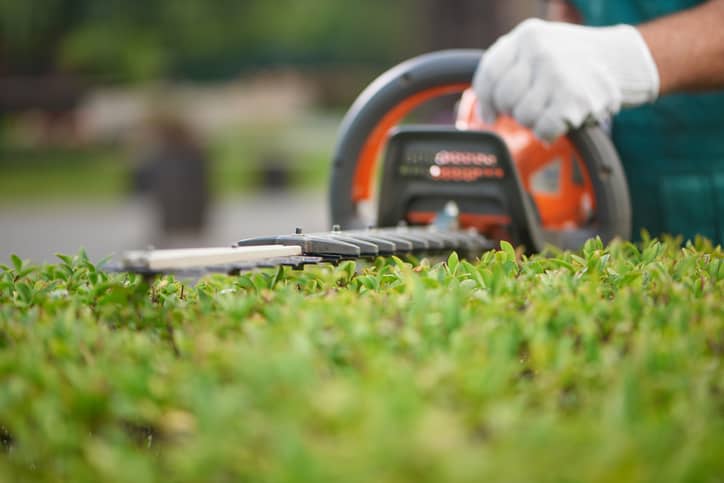
Reduced visibility can leave your apartment building vulnerable to attack as it can give intruders discreet access. Always maintain any shrubbery, bushes, or hedges, and don’t obscure any entrances to the building. Hedges should also not block the view from the road or any outdoor security cameras the building might have. Communal gardens that are unkempt and that obscure views give intruders opportunities to remain unnoticed.
4. Don’t neglect any nearby outbuildings or bike sheds
Darker areas can attract loitering and antisocial activities during the nighttime. If your apartment complex has outdoor storage areas, such as sheds or bike racks, security measures must be put in place to keep belongings safe and secure. Security lights will act as a deterrent to criminal activity and it is also important to ensure the doors are functioning optimally and secured with a locking system. You could also consider a battery-operated shed alarm, which responds to movement or door contact with an extremely loud siren.
Securing your flat’s entry points
There may be fewer entry points to a flat than a house, but they need to be as secure as possible. It’s good to encourage a sense of community amongst residents in the building, with all occupants ensuring that communal doors are never left open and keeping an eye out for suspicious activity
1. Make your front door more secure
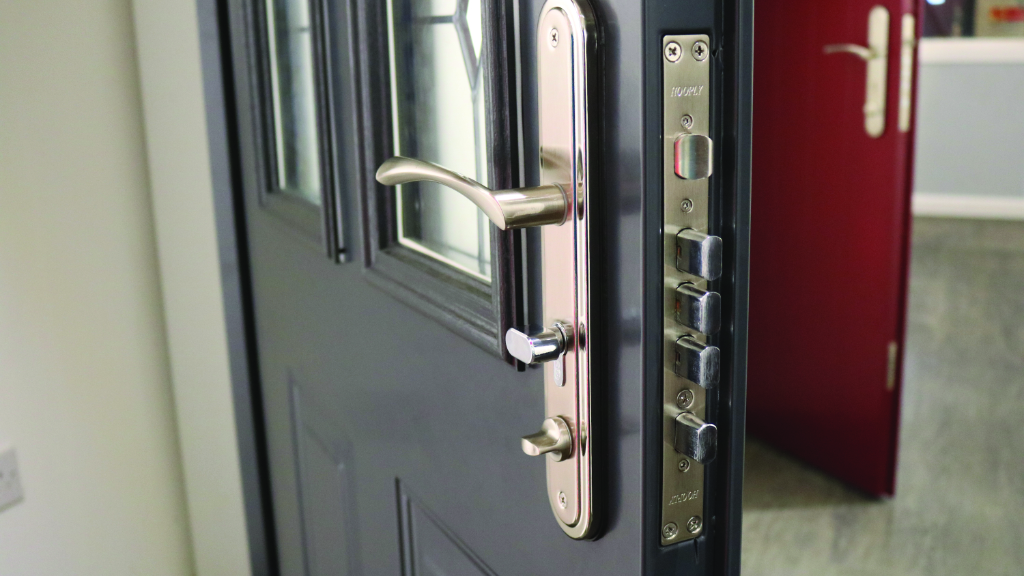
A strong front door is crucial in protecting your flat from break-ins. A forceful kick on a wooden door can break the lock or split the door from the frame. A big blow to a uPVC door can cause it to collapse or tear away from the frame. Without a sturdy door in place, locks, lighting, and other security measures are ineffective in preventing break-ins. Steel front doors are now available for residential use, which are both aesthetically pleasing and highly secure. Read more on how to improve your front door security here.
2. Remember not to forget any side or rear doors
For residents living on the ground floor, it is common to have a side or rear door in addition to the front door. These doors require the same level of security attention.
3. Improve your window security
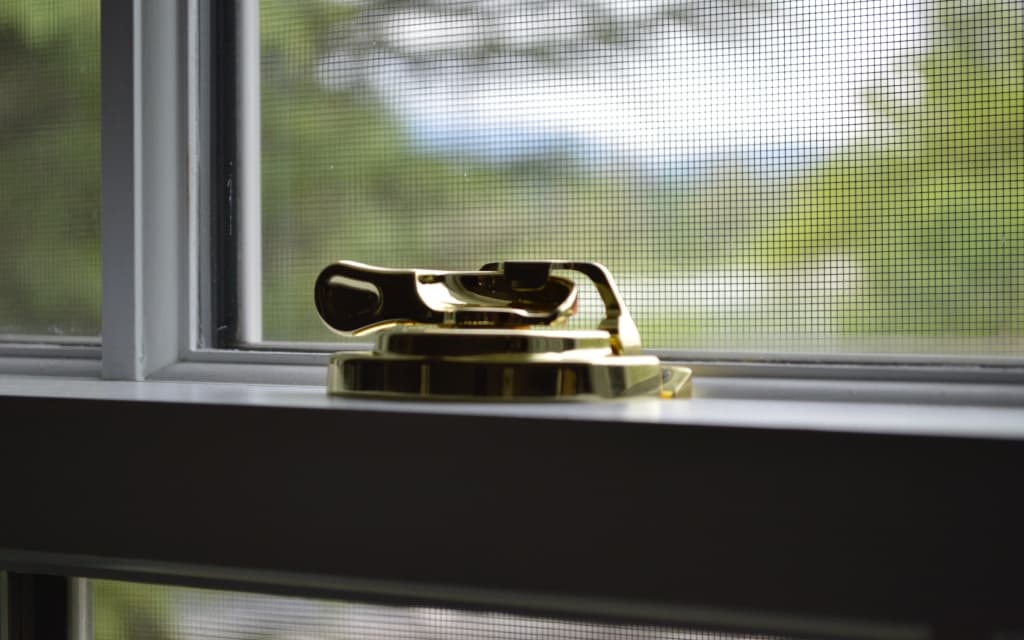
Once the front, side, and rear doors are secure, don’t forget to secure the windows. Firstly, ensure all windows have locks installed and always lock them when closed. Before leaving your flat, always check that all windows are locked and closed. For extra precaution, especially if the flat is located on the ground floor, you could also install security shutters and security bars.
4. Ensure communal doors are secure
A communal door has many people coming and going throughout the day. Along with residents and visitors, a building will see tradesmen, postmen, workmen, and delivery people being buzzed in by one of the occupants. It’s vital to always lock communal doors after entering the building to keep out any unauthorised visitors. You must not allow anyone into the building whom you do not know, regardless of their claim or identity.
If possible, consider implementing an access control system, such as key fobs or security codes. This ensures that only authorised individuals have access to the building. You could also consider upgrading the communal doors and frames to ones that are reinforced and more durable, as this can make it more difficult for intruders to break in.
The entrance should also be well-lit with the use of security lighting, both day and night, as this can help deter potential intruders and increase visibility for residents and surveillance cameras. Regularly maintaining and checking the security of the communal doors and surrounding area can help ensure that any potential security weaknesses are addressed.
5. Improve the security of your balcony (if you have one)
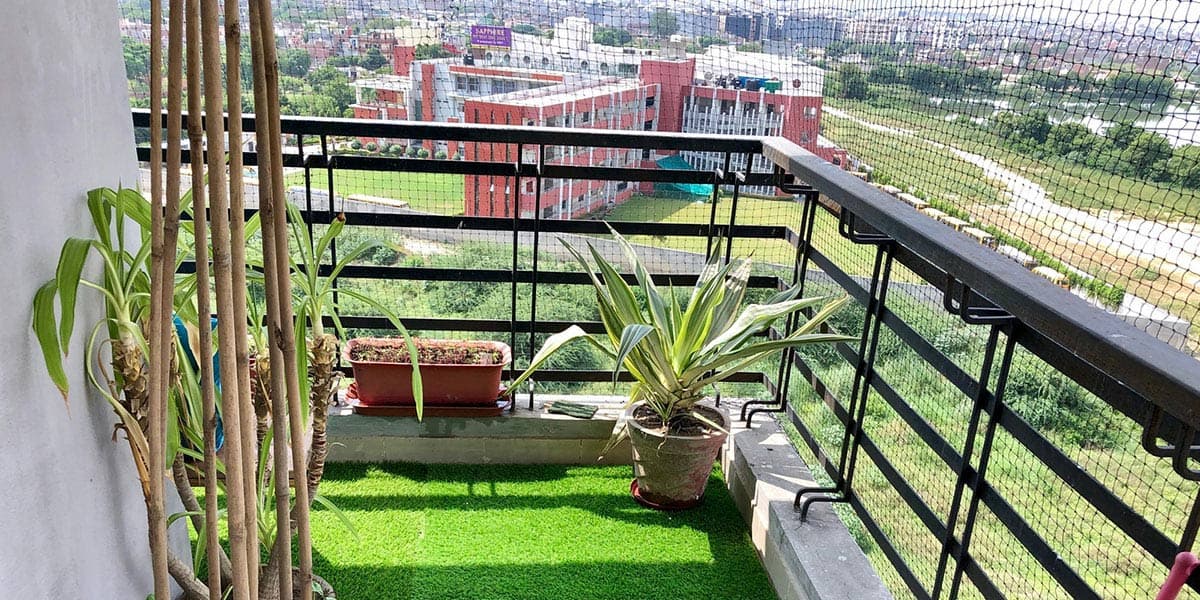
Balconies are an attractive feature in homes, but they also pose a security risk. Burglars often use them as a point of entry into homes. To make your balcony more secure, you can implement various measures. First and foremost, it’s essential to lock your balcony door whenever you are not outside on the balcony. It is advisable to keep your balcony door locked throughout the day, especially at night when it is easier for burglars to strike.
For increased security, installing a security camera on your balcony is an excellent option. The camera should be positioned high enough to provide an unobstructed view of the entire balcony. Additionally, an alarm installed on the balcony door can help deter potential break-ins and alert you in the event of one.
While most balconies come with pre-installed locks on sliding patio doors, these locks don’t always offer the highest level of security. Installing additional locks alongside the pre-installed ones is highly recommended. It’s also advisable to make it more difficult for a thief to access the balcony from the outside. This can be accomplished by installing a privacy screen, trellises, bamboo screens, and thick plants and trees. By implementing these measures, you can make your balcony more secure and enjoy peace of mind.
Other quick tips to improve your flat security
1. Report anything suspicious
If you see or hear anything suspicious, you should report it to your local law enforcement agency. This could include anything from strange behaviour to potential terrorist activity. By reporting anything suspicious, you could help prevent a break-in in your building. Reporting suspicious behaviour outside of your flat is a crucial preventative measure for enhancing your flat’s security. When you report such behaviour, you are taking an active step towards preventing potential crimes from occurring.
The act of reporting suspicious behaviour itself is a powerful deterrent, as it sends a clear message to potential criminals that the community is alert and vigilant. Criminals are more likely to target buildings that appear vulnerable or unmonitored, and the presence of an active and watchful community makes them less likely to target your building.
Reporting suspicious behaviour can also lead to increased police presence in your area, which can further deter potential criminals. Additionally, it helps law enforcement agencies to monitor and track suspicious behaviour, and take necessary actions to investigate and prevent criminal activities from occurring. Furthermore, by reporting suspicious behaviour, you are also promoting a culture of community vigilance and collaboration. When everyone is aware and on the lookout for suspicious behaviour, they are more likely to communicate and collaborate, which can improve overall safety and security in the building.
2. Be cautious with strangers
If a stranger knocks on your door, or you spot someone unfamiliar in the apartment building, it is advised to not answer the door of your apartment. There have been cases of burglars using distraction techniques to gain entry to your home. It’s always best to contact emergency services if you or others are in danger in your home.
3. Give the impression someone is always home
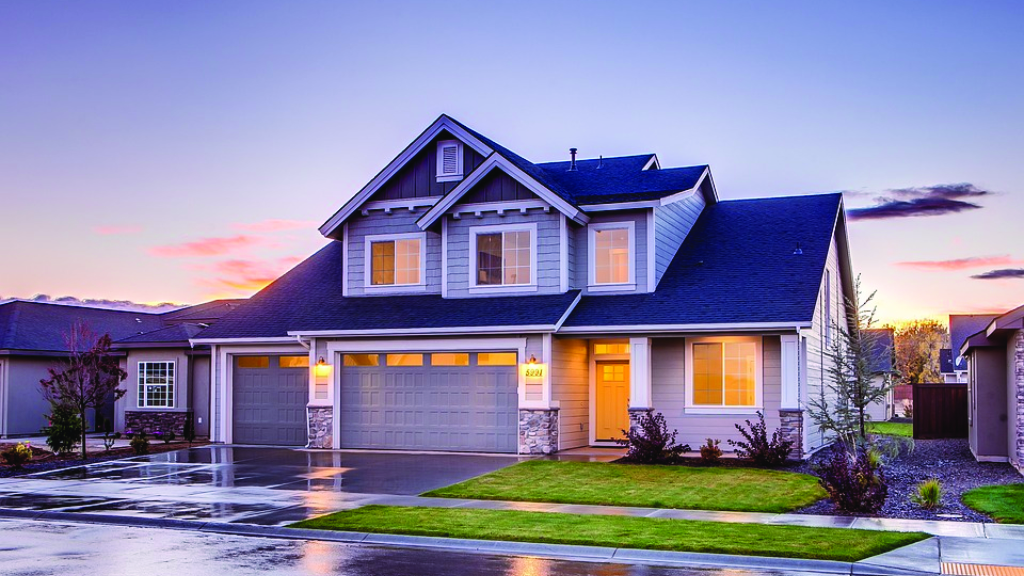
If you are going on holiday or out at work all day, you may feel your home is vulnerable to break-ins. If you want to give the impression that someone is in your home, you can leave a light on in the window. You can also purchase timers that will turn the lighting on at a specific time.
4. Don’t hide spare keys
If you have a spare key to your home, don’t hide it. Instead, keep it in a safe place, such as a lockbox or safe. This will make it easier for you to get into your home in case you lose your key or lock yourself out.
5. Know your neighbours
Greeting your neighbours can help establish who belongs and who doesn’t in the community, allowing residents to be more aware of any suspicious behaviour and report it if necessary.
6. Install a burglar alarm
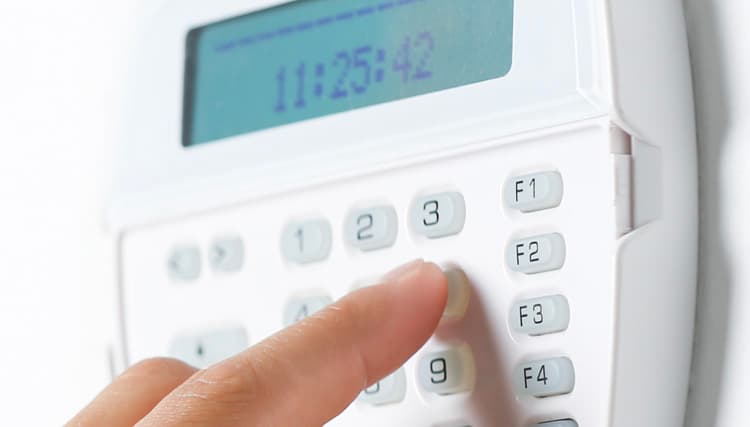
When it comes to securing your apartment block, a burglar alarm is an essential component. One of the most significant benefits of a burglar alarm is that it serves as a powerful deterrent. When potential thieves see that an apartment block has an alarm system in place, they are more likely to move on to a less well-protected building. This is because they know that the chances of being caught are significantly higher in a building with an alarm system.
Apart from acting as a deterrent, having an alarm system installed provides a crucial layer of security. In the event of an intruder gaining access to your flat, the alarm will sound and alert everyone in the building. This is more likely to cause the burglar to flee the property and so spend less time finding your valuables. In conclusion, a burglar alarm is an indispensable part of a comprehensive security system for an apartment block. It serves as a powerful deterrent and provides an added layer of security that can help keep you and everyone in your building safe.


